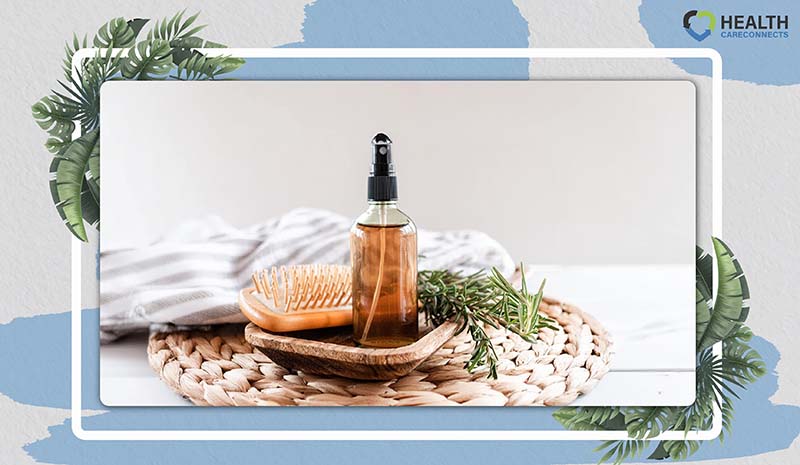Is rosemary water good for your hair? This article explores the benefits of rosemary water for enhancing hair health, including its potential to stimulate hair regrowth.
Discover how to prepare and use rosemary water effectively, and learn about the various ways it can improve your hair’s overall health and vitality. Explore the details of this natural remedy and see how it can change your hair care routine!
Is Rosemary Water Good for Your Hair?
Rosemary water offers several key benefits that contribute to a healthy scalp and promote hair growth. Its anti-inflammatory and antimicrobial properties can help alleviate issues like dandruff and scalp psoriasis. According to William Gaunitz, a certified trichologist and the founder of Advanced Trichology, rosemary acts as a cleanser and antiseptic for the scalp. Gaunitz explains that when individuals experience inflammation due to excessive oil and the presence of microorganisms like parasites, fungus, and bacteria, rosemary water can effectively cleanse the scalp and eliminate low levels of inflammatory microorganisms.
Moreover, research suggests that rosemary water may indeed stimulate hair growth. A randomized controlled trial conducted in 2015 demonstrated that rosemary oil was as effective as minoxidil, the active ingredient in Rogaine, in promoting hair growth after six months of consistent use. These findings underscore the potential of rosemary water as a natural and efficacious solution for enhancing hair health and encouraging regrowth.

How to Use Rosemary Water Effectively for Hair
You can use rosemary water in a couple of different ways to maximize its benefits for your hair. If you’ve stored it in a spray bottle, simply spritz it directly onto dry hair, then gently brush it from your roots to ends to ensure even distribution.
Alternatively, you can apply the rosemary water to freshly shampooed, wet hair before combing and drying as usual. For added hydration, you can apply a more generous amount of rosemary water to your hair and allow it to soak into the strands for a few minutes before rinsing and drying.
To further lock in moisture and nourishment, consider following up with a hair oil after drying to keep your hair hydrated and protected throughout styling. This simple routine can help you make the most of the benefits that rosemary water has to offer for your hair health.
3 Uses of Rosemary Water for Your Hair
Rosemary water has gained popularity as a natural solution for various hair concerns, offering a range of benefits that enhance hair growth and improve texture. Here are three ways rosemary water can benefit your hair:
Rosemary Water Helps Hair Grow Faster
Rosemary water is renowned for its ability to boost blood circulation to the scalp. This increased blood flow nourishes hair follicles, stimulating faster and stronger hair growth.
Research indicates that rosemary oil, a key ingredient in rosemary water, can be as effective as minoxidil, a common treatment for hair loss.

Rosemary Water Makes Hair Soft and Smooth
Rosemary water contributes to the overall texture of your hair, leaving it softer and more manageable.
The nutrients in rosemary coat hair follicles, reducing frizz and imparting a natural shine. Regular rinsing with rosemary water post-shampoo can result in softer, silkier hair.
Rosemary Water Helps Limit Dandruff
The antifungal and anti-inflammatory properties of rosemary combat dandruff effectively. Consistent use of rosemary water helps maintain scalp health by reducing the yeast responsible for dandruff and soothing scalp irritation associated with flaking and itching.

Disadvantages of Using Rosemary Water for Hair
Although rosemary water is generally considered safe to use on hair, be aware of potential downsides:
- Contact Dermatitis: In rare cases, individuals may experience contact dermatitis upon using rosemary water, characterized by symptoms like skin redness or irritation. If such reactions occur, discontinue use immediately and seek advice from a healthcare professional.
- Allergy or Hypersensitivity: Those with known allergies or hypersensitivity to rosemary or plants in the Lamiaceae or Labiatae family (mint) should avoid using rosemary water to prevent adverse reactions.
- Pregnancy and Breastfeeding: Due to its potential hormone-altering activity, rosemary water hasn’t undergone extensive testing in pregnant and breastfeeding individuals. Therefore, it’s not recommended for use during pregnancy or breastfeeding.
- Hair Darkening: Some users have reported hair darkening or staining due to the color of rosemary water. To mitigate this risk, individuals with lighter-colored hair or concerns about staining can opt for a less concentrated infusion by using fewer rosemary leaves or avoid using rosemary water altogether.
Instructions for Mixing Rosemary Water Properly
Creating your own rosemary water is a simple and rewarding process. With just two ingredients and a few minutes on the stove, you can craft a fresh batch that will invigorate your hair growth and impart a healthy shine.
Here’s how to make your own rosemary water:
Ingredients:
- 3 cups of water
- 2 sprigs of fresh rosemary
Instructions:
- Begin by bringing all 3 cups of water to a boil in a pot on the stove.
- Once the water reaches a rolling boil, add the two sprigs of fresh rosemary to the pot.
- Remove the pot from the heat and cover it with a lid, allowing the rosemary to steep in the hot water. Let it sit until the water cools completely, ensuring maximum infusion of herbal goodness.
- Once cooled, strain the rosemary water into a jar or spray bottle for easy application.
- Your homemade rosemary water can be stored in the refrigerator for up to 2 weeks, ensuring its freshness and potency.
- Consider preparing a larger batch to have on hand whenever your hair needs a revitalizing boost.
With these straightforward steps, you can enjoy the benefits of freshly made rosemary water whenever you desire.

Other Uses of Rosemary Water
Rosemary water offers more than just benefits for your hair—it can also enrich your overall well-being in various ways:
- Mood Enhancement: The lush, evergreen scent of rosemary can uplift your spirits and fill you with confidence and positivity. Research indicates that inhaling its fragrance may improve mood and alertness, providing a refreshing boost to your senses.
- Cognitive Boost: Studies suggest that rosemary may enhance cognitive performance by improving concentration and memory. This effect could be attributed to the neuroprotective properties of certain flavonoids found in rosemary, such as rosmarinic acid. Incorporating rosemary water into your hair care routine could potentially help you stay focused and sharp throughout the day.
- Stress Reduction: Evidence suggests that consuming rosemary may help alleviate feelings of burnout. Adding a few tablespoons of rosemary water to sparkling water creates a delightful drink that can inspire creativity and enhance focus. You can also experiment with incorporating it into cocktails, mocktails, and smoothies, pairing its woody undertones with flavors like mint, ginger, and bergamot.
- Skincare Benefits: Rosemary contains phenolic compounds like apigenin and luteolin, which possess potent anti-inflammatory and antioxidant properties. Including rosemary water in your skincare regimen may help clear your complexion by combating inflammation and protecting against free radical damage, which contributes to signs of aging.
- Oral Health: Given its natural antibacterial properties, rosemary water can be used as mouthwash to combat bad breath and protect gum health. Incorporating rosemary water into your oral hygiene routine offers a refreshing and effective way to maintain oral health.
Conclusion
In conclusion, rosemary water has become a popular topic on social media, with many users wondering, “Is rosemary water good for your hair?” Enthusiasts tout its benefits for hair and scalp health, backed by a wealth of anecdotal evidence. Scientific studies support the potential advantages of rosemary, noting its anti-inflammatory, antimicrobial, and antioxidant properties that could boost scalp circulation and promote hair growth.
However, caution is advised. Rosemary may interact with certain medications and could cause irritation or other side effects for some people. Consulting a professional ensures the safe and effective use of rosemary water in your hair care routine.
For those seeking more information and honest product reviews, I recommend visiting HealthCareConnect. Explore firsthand experiences from users and gain valuable insights to help inform your decision.

Dr. Joyce Slater: Your Guide to Informed Health Choices
Dr. Joyce Slater shines as a distinguished expert in the field of nutrition and public health. Contributing her vast expertise to HealthConnectbc, she embodies a deep-seated passion for enhancing public well-being. As a respected figure in her field. Dr. Slater’s academic journey and professional achievements are nothing short of inspirational.
Holding a significant position as a researcher and educator, Dr. Slater has delved deeply into the intricacies of food literacy and nutritional science. Her work, prominently featured in numerous esteemed scientific publications, underscores her dedication to expanding our understanding of food’s role in health and society.
At the heart of Dr. Slater’s professional ethos is a profound desire to positively impact individual lives through education and research. She often says, “Empowering people with the knowledge to make healthier choices is the most rewarding aspect of my work.” This principle is the cornerstone of her involvement with HealthConnectbc, where she strives to provide reliable and practical health advice.
Dr. Slater’s contributions to HealthConnectbc are multifaceted: academically, she offers insights into the complex world of nutrition and health, enhancing both public understanding and professional practices. Additionally, she is instrumental in guiding and inspiring the next generation of health professionals, thus fostering future excellence in the field.
Juggling rigorous research with her educational duties, Dr. Slater demonstrates an unwavering commitment to her profession. Her approachable nature and genuine concern transcend the confines of academia, touching the lives of everyone she interacts with. Dr. Slater looks forward to continuing her journey of discovery and education, dedicated to the ongoing improvement of public health and nutrition.
At HealthConnectbc, Dr. J. Slater is not just a contributor; she is a guiding light, dedicated to enlightening and motivating individuals towards a healthier and more informed lifestyle.
PUBLISHED ARTICLES
- Food literacy competencies: A conceptual framework for youth transitioning to adulthood (2018)
- Self-perceived eating habits and food skills of Canadians (2016)
- Challenges to acquiring and utilizing food literacy: Perceptions of young Canadian adults (2016)
- Socio-demographic and geographic analysis of overweight and obesity in Canadian adults (2009)
- Sustainable well-being: Concepts, issues, and educational practices (2014)

